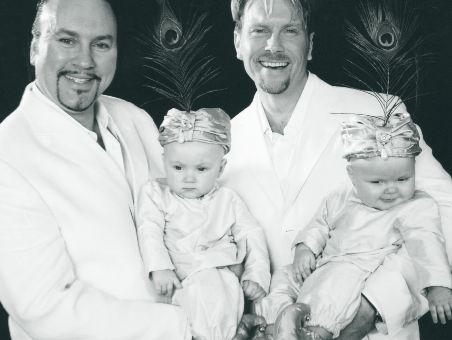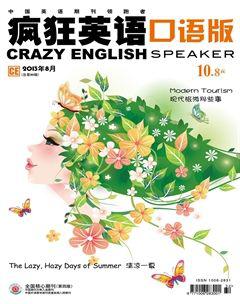在同性恋家庭长大的女孩
Terry Gross (Host): Its not unusual now to see children with gay parents, but it was uncommon when my guest was raised in the 70s and 80s by her gay father. Alysia Abbott has written a new 1)memoir about growing up in the early years of the gay rights movement in the capital of gay America, San Francisco.
Its called “Fairyland: A Memoir of My Father.” Her father, Steve Abbott, was a poet, essayist and editor. He described himself as 2)bisexual when in 1969 he married the woman who became Alysias mother. They were both graduate students at Emory University in Atlanta. Alysia writes that while her parents shared a bed and a life, her father helped organize Atlantas Gay Liberation Front and was the gay lib editor at Atlantas alternative weekly, The Great Speckled Bird.
特丽·格罗斯(主持人):现在看到同性恋父母带着孩子并不觉得异乎寻常,但我的嘉宾在20世纪七八十年代由她的同性恋父亲养大,那时那样的事并不寻常。阿莉西娅·阿博特写了一部新的回忆录,讲述自己在同性恋者权利运动早期在美国同性恋之都——旧金山市的成长故事。
书名叫《梦游仙境:回忆我的父亲》。她的父亲史蒂夫·阿博特是一位诗人、散文家和编辑。在1969年他跟后来生下阿莉西娅的女人结婚时,他描述自己是双性恋者。他们俩都是亚特兰大埃默里大学的毕业生。阿莉西娅在书中描述到,当她父母同床共枕共同生活时,她父亲协助组织同性恋解放阵线,也是另类周刊《带花斑的大鸟》同性恋解放版的编辑。
Two years after Alysia was born, her mother was killed in a car accident. Soon after, her father decided they would move to San Francisco, and the Haight-Ashbury neighborhood became their home. He died of AIDS-related 3)complications in 1992. Alysias new memoir is based in part on her fathers journals.
And I havent read anything about a child of a gay parent 4)at the dawn of the age of the gay liberation era. Do you feel like this gives you a kind of unique perspective on that era?
Alyaia Abbott: Yes. I mean I think that the experience of being a child of a gay parent in my generation or the child of a gay parent 5)coming of age today is very different. Most of the children born of gay parents in the first two decades after Stonewall, those children were the products of 6)heterosexual unions, usually straight marriages.
And so in those situations 7)typically the parent was 8)closeted, and would come out after the child was born, and either the parents would divorce or maybe the parent wouldnt come out. But usually in those situations the child would live with one of the parents, and because of the way the courts were set up, they were often living with the straight parent or sometimes with the mother.
My situation was unique because my mother died, and so there really wasnt anyone clearly who I was going to live with other than my father. So he was—I was living in an 9)exclusively gay-headed household from as early as I can remember. Children today, they are usually the product of a gay couple who would either adopt a child or go through a process of 10)artificial insemination to have a child. But its very much they are as a couple wanting to have a child together.
Gross: And suddenly your father, who wasnt really ready to be a father, was your only parent. Your aunt had offered to adopt you, but your father insisted on keeping you. Considering his reservations about being a parent, do you feel like you understand why he kept you?
Abbott: Absolutely. For one thing, my father wrote about in his journals feeling this connection with me after I was born. So before I was born he wasnt necessarily very enthusiastic about having a child, but after I was born he really enjoyed spending time with me. And actually for a short period he was a sort of house husband, before even John Lennon was a house husband, working from home, trying to sell his work while my mother was working a nine-to-five job.
And so after my mothers death, I think my father felt like he didnt have very much. His relationship with a young man that he had while he was with my mother had 11)dissolved, and he in a sense felt that I was all that he had in the world, and he was all that I had in the world. So I dont think he could have imagined letting my aunt or anyone else take over raising me.
Gross: When you were a young child, after your mother died, your father decided to move to San Francisco. So you and he moved there. And early on he had other roommates living with you, including one or two men who were 12)drag queens. And Im wondering what your reaction was—at a very young age, when you hadnt been exposed to much at all. So nothing—in some ways nothings unusual when youre very young because everythings new. Abbott: Exactly.
Gross: So what was your reaction to seeing, you know, men who you were living with in dresses and lipstick?
Abbott: Well, my father had already been sometimes wearing dresses in Atlanta. I think for my father wearing a dress was a political statement. When we were in San Francisco and we were living with two men, one of whom was a drag queen fulltime, another one who would sort of dress up to go out, I really saw it as play.
At the time I would have been about four years old, and I liked to dress up. I liked to put on fancy scarves and the makeup, and it was all something that we could do together. I never sensed that what my father or any one of his friends were doing was weird until I became older and became more aware of what normal families look like and what normal men and normal women did.
Gross: And I want to say, again, you know, that this is an era, were talking about, you know, the 70s here. This is the era before the gay marriage movement. It was the era before so many gay people were actively, you know, trying to become parents or had already become parents. And your father was part of this, you know, gay mens community in San Francisco in the Castro and Haight-Ashbury that was—it wasnt about marriage. It wasnt about having children. But your father had a child, he had you.
And so you were like a real 13)anomaly within that community that your father was part of. How old were you when you started realizing that you were something really different in this community?
Abbott: Well, I think from a young age I realized I was something different in this community because it was a community of, you know, young men, and here I was a little girl. So I didnt see other little girls around. So I was always— felt different. But from an early age I sort of liked this difference. That meant I could get all the attention. There was no one like me, and I felt sort of special in a way.
But I think on one level as a straight child of a gay parent I always felt like a little too straight for the gay community but also a little too gay for the straight community. So I think I felt a little bit ill at ease in either world.
Gross: Talk a little bit more about feeling too straight for the gay community. Do you think anybody was hoping that youd be—anybody in your fathers circle or your father himself had hoped in any way that youd be gay, that youd be a lesbian?
Abbott: Oh no, absolutely not. I mean I think because there were so few gay parents that we knew that just my presence in certain situations, you know, I was a little too straight for the gay community, meaning not that my sexuality was too straight, I was a little girl, but that my presence was reminding people of the world of sort of traditional family structure and responsibility that some people were trying to escape from.
阿莉西娅出生两年后,她母亲在一次车祸中丧生。不久后,她父亲决定要搬到旧金山市,海特-艾许伯里区一带成为了他们的家。他在1992年因为艾滋病有关的并发症而去世,阿莉西娅的新回忆录部分是基于她父亲的日记。
我从没读过在同性恋解放时代初期,同性恋父母养育孩子的故事。你是否觉得这让你对那个时代有独特的看法?
阿莉西娅·阿博特:是的。我的意思是我认为在我的年代作为同性恋父母的孩子,和今天的同性恋父母的孩子的经历是不一样的。石墙暴动之后(1969年纽约爆发的大规模同性恋暴动)的头20年出生在同性恋家庭的孩子,都是异性恋爱的结晶,通常也是异性婚姻。
所以在那些情况里,一般父母一方是隐蔽同性恋者,在小孩出生后就显露出来,或者父母离婚,或者隐蔽同性恋父或母没显露出来。但是通常在那些情况,孩子会跟其中一方父母居住,因为基于法律成立的初衷,他们通常会跟非同性恋父或母生活,有时是跟母亲一起。
我的情况特殊是因为我母亲去世了,所以除了跟我父亲,我不清楚还能跟谁一起生活。于是从我记事起,我和他就住在特定的以同性恋者为首的家庭里。如今,同性恋家庭里的孩子或是同性恋夫妇收养,或是通过人工授精的途径得到。但大多都是他们作为夫妇想共同抚养一个孩子。
格罗斯:你的父亲还没真正准备好做一位爸爸,突然间就成为了你唯一的监护人。你姨妈提出过收养你,但你父亲坚持要抚养你。考虑到他作为父亲的迟疑,你认为自己明白他为什么要抚养你吗?
阿博特:完全明白。首先,我父亲在他的日记里写下了我出生后他跟我关系的感受。虽然我出生前,他并没有热衷于要一个孩子,但我出生后他确实很愿意和我在一起。实际上有很短一段时间他有点像居家丈夫,这甚至是在约翰·列侬(英国著名摇滚乐队“披头士”成员)当居家丈夫之前,他在家工作,努力出售自己的作品,那时我母亲是上朝九晚五的班。
所以我母亲去世后,我想我父亲觉得失去太多,他跟我母亲在一起的同时跟他相恋的一个小伙子也跟他分手了,于是在某种程度上他觉得我就是他在世上唯一的亲人,他也是我在世上唯一的亲人。所以我认为他无法想象让我姨妈或其他任何人来抚养我。
格罗斯:你母亲去世后,你还是小孩子的时候,你父亲决定搬去旧金山市,于是你和他搬到了那里。早期他有其他舍友跟你们一起住,包括一两个爱男扮女装的男子。我想知道在你小小年纪还没有接触太多的时候,你有什么反应。在某种程度上对你没有什么不寻常,因为你还很小,一切都是新鲜事物。
阿博特:没错。
格罗斯:那么,你知道,当你看到跟你一起住的男人穿裙子涂口红,你有什么反应?
阿博特:哦,在亚特兰大的时候,我父亲有时也穿裙子,我以为我父亲穿裙子是代表了一种政治观点。当我们在旧金山市的时候,我们跟两个男人一起住,其中一个整天都穿女装,另一个就会打扮得花枝招展才出门,我真的把一切看作是好玩。
我大概4岁的时候,也喜欢打扮。我喜欢戴奇特的围巾和化妆,这些事情我们都会一起做。我从没感觉到我父亲或他的任何一个朋友的做法都是怪异的,直到我长大了些,越来越意识到正常家庭的模样、正常男女的做法。
格罗斯:我想再说一次,你知道,这是一个时代,我们在谈论20世纪70年代,这是同性恋婚姻运动前的时代。在那个时代很少同性恋人们会积极努力想成为父母或已经成为父母,而你的父亲是旧金山市卡斯特罗和男同性恋社团的其中一分子,那里不讲婚姻,不讲抚养孩子。但你的父亲有个孩子,他有你。
所以在你父亲的同性恋圈子里,你真的就像一个异类。当你开始意识到自己在这个圈子里是另类的时候,你有多大?
阿博特:呃,我想我在很小的时候就意识到自己在这个圈子里跟大家不一样,因为这个圈子都是年轻男人,而我是个小女孩。我没见过那里有其他小女孩,所以我总是感觉不一样。但是在小时候我有点喜欢这种不一样,那意味着我会得到所有的关注。没人跟我一样,某种程度上我感觉自己有点特别。但在某种程度上,作为同性恋父母的直人孩子,我总是感觉自己在同性恋圈子里太“直”,而在直人圈子里又有点太“弯”,所以我在两个圈子里都觉得惴惴不安。
格罗斯:谈到在同性恋圈子里感觉太“直”,你认为有人希望你,你父亲圈子里的人或你父亲希望你会是同性恋者吗?
阿博特:没有,绝对没有。我的意思是我认为自己存在的特定场合导致我们认识很少同性恋父母,我在同性恋圈子里显得太“直”,并非意味着我的性取向太“直”,我当时还是个小女孩,我的存在提醒了世人传统家庭的结构和某些人正竭力逃避的责任。

